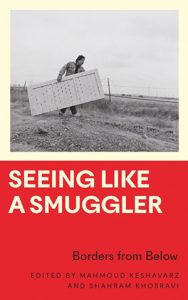Seeing Like a Smuggler: Borders from Below

Editor: Mahmoud Keshavarz and Shahram Khosravi
Publisher: Pluto Press
Year of Publication: 2022
Print Length: 216 pages
Genre: Non-Fiction / Essay, Anthropology, Migration & Refugee Studies, Cultural Studies
Area: Afghanistan, Bangladesh, Colombia, Ethiopia, Guatemala, Kurdistan, Mexico, Saudi Arabia, Singapore, South Africa, Zimbabwe
Topic: Smuggling & Human Trafficking, Asylum & Asylum Seekers, Refugees & Forced Migration, Asylum & Refugee System, Migration, Mobility & Immobility, Movement of People and Ideas, Freedom to Move and to Stay, Boat Turnbacks, Borders, Immigration Control, Legality & Illegality, Drugs, Challenges & Opportunities, Material & Infrastructure, Culture & Society, Economy, Enterprise, Poverty, Equality & Inequality, History, Policy & Practice, Colonialism & Post-Colonialism, Ethics & Morality, Ethnography, Visual, Art & Design, Bottom-Up Research
The word smuggler often unleashes a simplified, negative image painted by the media and the authorities. Such state-centric perspectives hide many social, political and economic relations generated by smuggling. This book looks at the practice through the eyes of the smugglers, revealing how their work can be productive, subversive and deeply sociopolitical.
By tracing the illegalised movement of people and goods across borders, Seeing Like a Smuggler shows smuggling as a contradiction within the nation-state system, and in a dialectical relation with the national order of things. It raises questions on how smuggling engages and unsettles the ethics, materialities, visualities, histories and the colonial power relations that form borders and bordering.
Covering a wide spectrum of approaches from personal reflections and ethnographies to historical accounts, cultural analysis and visual essays, the book spans the globe from Colombia to Ethiopia, Singapore to Guatemala, Afghanistan to Zimbabwe, and from Kurdistan to Bangladesh, to show how people deal with global inequalities and the restrictions of poverty and immobility.
Table of Contents
Series Preface
Acknowledgements
About the Cover Image
Introduction: To See Like a Smuggler — Mahmoud Keshavarz and Shahram Khosravi
1. Smuggling as a Collective Enterprise: Ethiopian/Wollo Migration to Saudi Arabia — Tekalign Ayalew Mengiste
2. Aurelian Dreams: Gold Smuggling and Mobilities across Colonial and Contemporary Asia — Nichola Khan
3. The Border Merchant — Aliyeh Ataei
4. Smugglers and the State Effect at the Mexico-Guatemala Border — Rebecca B. Galemba
5. Kolbari: Workers Not Smugglers — Amin Parsa
6. From the Smuggling of Goods to the Smuggling of Drugs in La Guajira, Colombia — Javier Guerrero-C
7. Contesting Common Sense: Smuggling across the India-Bangladesh Border — Debdatta Chowdhury
8 The Bus Economy: A 90-day Gateway across Zimbabwe-South Africa — Kennedy Chikerema
9. Illicit Design Sensibilities: The Material and Infrastructural Potentialities of Drug Smuggling — Craig Martin
10. A Partial Offering: In and Out of Smuggling — Simon Harvey
Afterword: Seeing Freedom — Nandita Sharma
Bibliography
Notes on Contributors
Index

Mahmoud Keshavarz is an Associate Professor of Cultural Anthropology at Uppsala Universiteit. His work focuses on how borders are shaped by the materials, images, designs, and technologies that have emerged through colonialism and continue to be present in everyday lives. He has done ethnographic fieldworks on materialities of undocumented lives, practices of people smuggling and border transgression, and colonial imaginaries of humanitarian design and innovation in Europe. He holds a PhD in Interaction Design (2016, Malmö University) with a thesis specialisation in design studies and ethnography which won the award for best dissertation at Malmö University for the academic year of 2016–2017. From 2019 until 2023, he was co-editor-in-chief of the internationally peer-reviewed journal Design and Culture. He is the co-founder of Decolonizing Design collective and Critical Border Studies network. He wrote The Design Politics of the Passport: Materiality, Immobility, and Dissent (Bloomsbury, 2019).
Source: https://www.katalog.uu.se/profile/?id=N17-1402
More from Mahmoud Keshavarz in this library, click here.

Shahram Khosravi is a Professor of Social Anthropology at Stockholm University. His research interests include anthropology of Iran and the Middle East, migration, displacement and border studies. His research network includes Critical Border Studies, a network that aims to push forward collaborative research projects; organize conferences and workshops; and create a forum for contacts and collaboration between researchers. His two recent projects are After Deportation (a study of post-deportation experiences of asylum seekers from Sweden) and Waiting (How undocumented migrants waiting for residence permits in Sweden). He has published several books and articles in peer-reviewed journals.
Source: https://www.su.se/english/profiles/shahram-1.185094
More from Shahram Khosravi in this library, click here.
